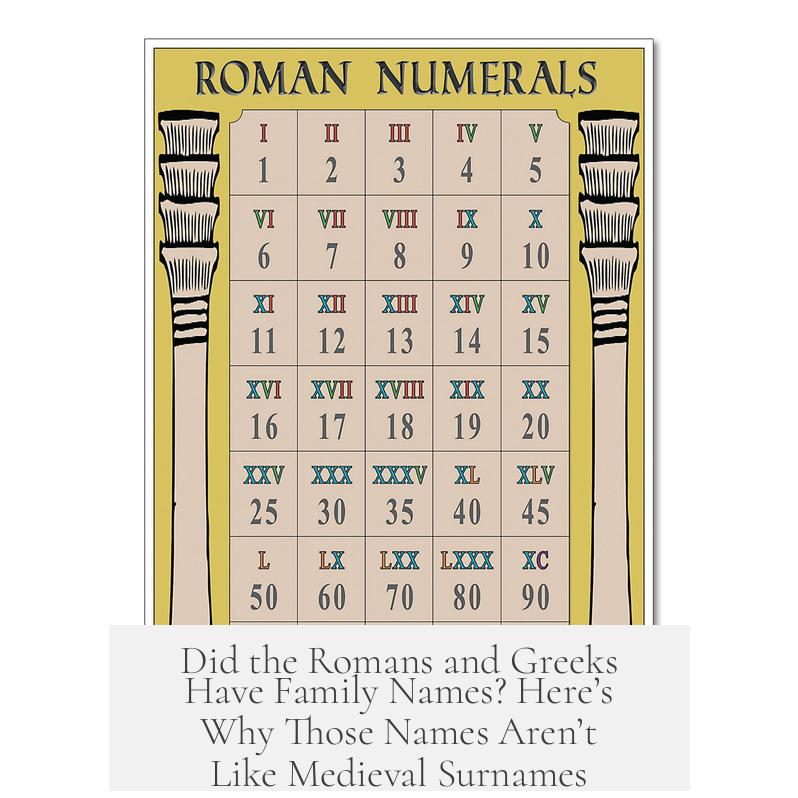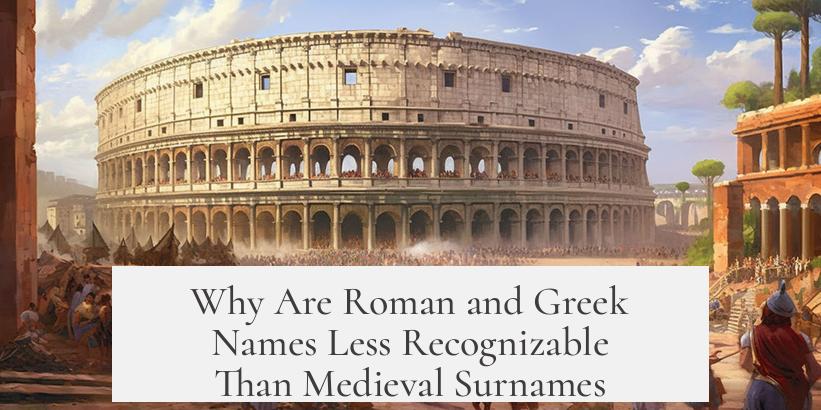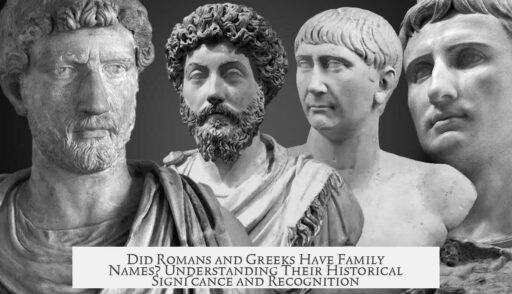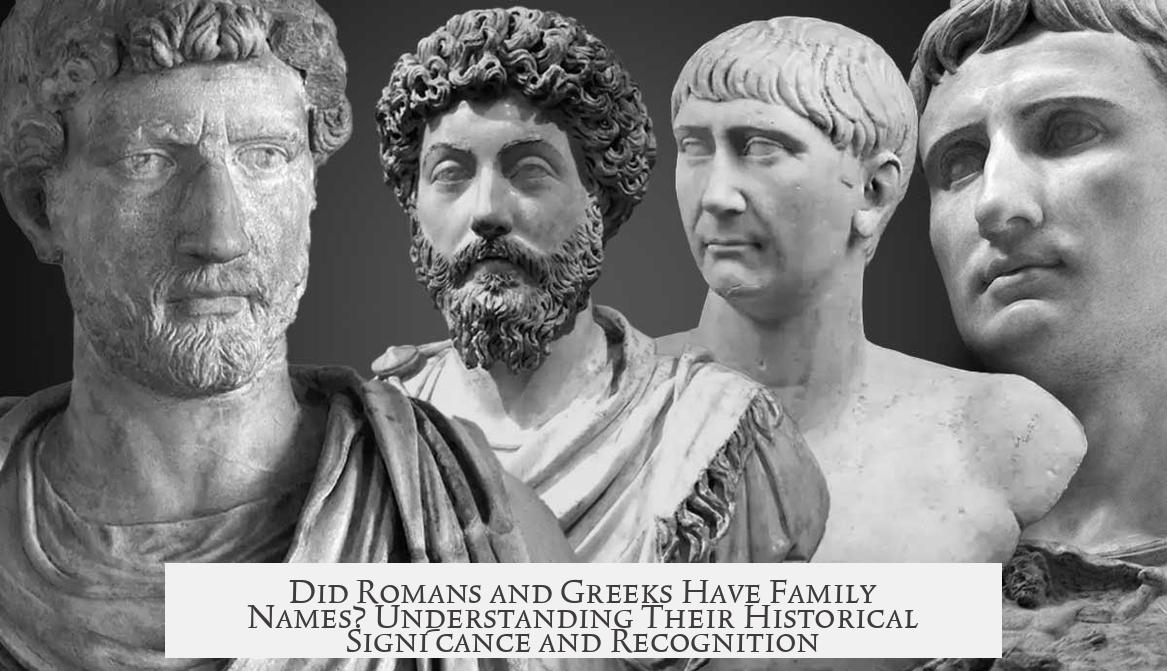The Romans did have family names, known as the nomen, but Greek naming conventions mostly lacked fixed family names. The Roman family name identified a person’s gens, a larger clan indicating social status. Greek names relied more on patronymics, demotics, and city identifiers, so family names were less consistent and less commonly recognized across generations.
Roman citizens typically used three names (tria nomina): the praenomen (given name), the nomen (gens or clan name), and the cognomen (a nickname that could become hereditary). For example, Gaius Julius Caesar’s nomen was “Julius,” marking his membership in the prestigious gens Julia, a patrician family. This system helped define social standing and lineage clearly. Over time, the cognomen also grew in importance and sometimes identified different branches within the same gens.
In contrast, classical and Hellenistic Greeks generally did not have fixed family names. Instead, they used patronymics to indicate descent (e.g., “X son of Y”) and added a demotic, which identified local administrative units called demes. Thus, a Greek name might include a personal name, a father’s name, and the deme, such as “Alkibiades son of Kleinias of Skambonidai.” These identifiers were flexible and community-centric rather than stable family names.
Some powerful Greek families had clan-like names (such as the Alkmaionidai in Athens), but these were exceptions rather than the rule. Famous Greeks were often known by their city of origin or residence (e.g., Xenophon the Athenian), which helped to distinguish them in the absence of fixed family names.
The reason medieval family names are more familiar today is that by then, hereditary surnames had become widespread, passing consistently from one generation to the next. This hereditary aspect made medieval family names more recognizable and traceable over centuries. Roman family names were limited to elites and did not always pass to descendants in the same way, while Greek names relied on flexible systems tied to immediate lineage and local context, not on stable family identifiers.
- Romans used a three-part naming system including a family nomen.
- The gens identified a Roman family and social status.
- Greek names primarily used patronymics and demotics, lacking fixed family names.
- Some Greek clans had family-like names, but mostly names varied with generations and locale.
- Medieval surnames became hereditary and stable, making them more widely known today.
Did the Romans and Greeks Have Family Names? Here’s Why Those Names Aren’t Like Medieval Surnames

Yes, the Romans and Greeks did have family names, but they worked very differently from the medieval family names we’re familiar with today, and that’s why you might not recognize them as easily.
We’ve all heard of famous medieval surnames like Tudor, Plantagenet, or even Smith. Somehow, these names stick in everyone’s mind as family names. But what about the Romans and Greeks? Did they have family names that were passed down? And if so, why don’t we recognize them in the same way?
Let’s unravel this ancient naming game with some fun facts and examples. Ready to dive in?
The Roman Family Names: More Than Just a Last Name
The Romans often rocked not just one or two names, but a triple name combo: praenomen, nomen, and cognomen. The nomen was essentially their family name. Think of it as the family brand or tribe.
Take Julius Caesar for example. His full name was Gaius Julius Caesar. The middle piece, “Julius,” tells you he belonged to the gens Julia, the mighty Roman family clan. This gens, or family group, was very important back then—it told you your social status and where you fit in Rome’s hierarchy.
Not all gens were equal. Some were plebeian (common folk), while others, like gens Julia, belonged to the aristocracy—the patricians. So, knowing someone’s nomen could tell you if you were rubbing elbows with nobles or ordinary citizens. In fact, many famous Romans are still identified by their nomen today, even if we forget what it means exactly.
But wait, there’s more! The cognomen, the third name, often started off as a casual nickname. Basically, it was a way to tease or highlight something about you. For Caesar, some scholars think it might’ve meant “hairy”—odd for a leader, right?
Over time, these nicknames, initially personal and unofficial, became hereditary. This means branches of the same family would wear different cognomina to distinguish themselves. So, a Roman could be “Gaius Julius Caesar” if he was from one branch, and another might be “Gaius Julius Bassus” from a different offshoot.
Greek Names: Seeking Identity Without Traditional Family Names
Now, in ancient Greece, the story changes a bit. Unlike Romans, most Greeks during the Classical and Hellenistic periods didn’t have family names that passed from generation to generation. Confusing? Yes, but it worked for them.
Instead, the Greeks leaned heavily on the patronymic system. Basically, your name connected directly to your father. Think of a modern game of “Hey, you’re the son of…” For example, “Alkibiades son of Kleinias.”
Interestingly, fathers and sons rarely shared exactly the same name, but names typically jumped back and forth every other generation—grandfather to grandson sharing a name, but skipping the middle generation. Kind of like a family name spread out over time.
Sometimes, a third label, the demotic, was added. This identified the person’s local tribe or administrative district, much like adding a hometown to your name. So you might get “Alkibiades son of Kleinias of the deme Skambonidai.” This was important because Athens was divided into demes that acted like tiny counties. These helped identify where someone belonged politically or socially.
And if you were famous or from a notable place, it was common for Greeks to be called after their city of origin or residence—“Dionysus of Halicarnassus” or “Xenophon the Athenian.” This was especially useful when mingling with people from different areas.
Exceptions to the no-family-name rule existed too. Powerful or legendary families like the Geomoroi of Corinth or Alkmaionidai of Athens sometimes had family names, but they were rare and mostly tied to myths or political influence rather than everyday use.
Why Are Roman and Greek Names Less Recognizable Than Medieval Surnames?

Here’s the kicker: the way names were handed down and used by Romans and Greeks is different from the medieval surname tradition. Medieval family names became fixed and passed down, warning neighbors that you were “from the Smith family” or “the Tudors,” building a brand you could recognize and track over centuries.
Roman names are fascinating but tricky because of the three-name system and the combination of gens and cognomen, which might look like a surname but wasn’t quite the same. Also, not all Romans had three names; early on, many didn’t use cognomina.
Greek names, meanwhile, remain less familiar because their names changed depending on father, social group, and place rather than a steady, inheritable family name. This made tracking lineage like tracing a flowing river—sometimes muddy and unclear, rather than a straight family tree.
So, the family naming concept did exist but lacked permanence and uniformity compared to medieval Europe. With less rigid inheritance of names and more focus on immediate father-son links or local IDs, the ancient names don’t have the same staying power in our cultural memory.
How This Shapes Historical Understanding Today
Because the Greeks and Romans didn’t have stable, clear family names like later medieval Europeans, historians face a challenge. Sorting through identity requires care. References to “Julius” or “Caesar” need context—the gens, possibly the branch of the gens, even the social standing.
For Greece, knowing the demotic or patronymic is essential to figure out who’s who. Think of it like a jigsaw puzzle where every piece is a different clue about place, father, or tribe.
This helps explain why we remember famous Romans by their family names—because gentes like Julia or Cornelia have strong historical backs, whereas Greek personal names rely more on immediate connections rather than inherited surnames.
In Conclusion: What’s in a Name?
The Romans and Greeks definitely had ways to denote family ties, but the systems differed widely from the medieval family name tradition. Romans had the gens and cognomen, offering a layered identity tied to family and social rank. Greeks preferred patronymics and social grouping by deme or city origin, painting a dynamic social picture rather than a fixed family label.
Next time you hear “Gaius Julius Caesar,” remember that “Julius” is his family genus, not a simple last name. And if you come across an ancient Greek like “Alkibiades son of Kleinias of Skambonidai,” know that his name tells a colorful story about his family and place rather than a surname in the modern sense.
So, family names? Yes, but not as predictable or popular as medieval surnames, explaining why they seem mysterious or less recognizable today. Isn’t it a relief that even ancient names had their own tangled, quirky systems?




